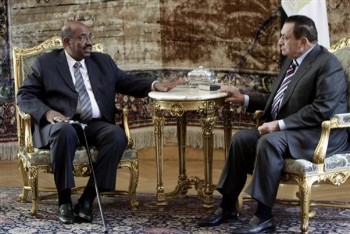Sudan’s Bashir receives warm welcome and support in Egypt
March 25, 2009 (CAIRO) — The Sudanese president Omer Hassan Al-Bashir paid a defying visit to Egypt in his second visit since the International Criminal Court (ICC) issued an arrest warrant for him on charges of war crimes in Darfur.

The visit was not formally announced by Cairo but news agencies reported the visit quoting yesterday quoting officials who requested anonymity because they were not authorized to release the information.
Bashir was accompanied by Foreign Minister Deng Alor, Presidential Affairs Minister Bakri Hassan Saleh, and the head of Sudanese intelligence Salah Gosh.
The two leaders held a closed session that was later expanded to included members of the delegation in both countries. Mubarak hosted lunch for the Sudanese delegation afterwards.
The Egyptian foreign minister Ahmed Aboul-Gheit told reporters that Mubarak and Bashir discussed the Darfur crisis and securing humanitarian access to the displaced population in the region.
Aboul-Gheit said his government expressed readiness to “close any gaps” in humanitarian presence in Darfur following decision by Khartoum to expel over a dozen relief groups from the war ravaged region.
He also said that Egypt will be dispatching medical teams to Darfur as part of an assistance package.
The US has said that it is intensifying contacts with Arab and African countries that are close to Khartoum to press Bashir to revoke the expulsion order. However Sudan said that the decision is “irreversible”.
The Egyptian top diplomat also said that Mubarak and Bashir discussed the ICC row and expressed “dissatisfaction” with the way the court “handled the status of the Sudanese president”.
However Aboul-Gheit urged Sudan to conduct national proceedings to block any intervention by the ICC on the grounds that Khartoum is not genuine in its prosecutions of war crime suspects including rebel leaders.
Egypt is not a signatory if the ICC Statue and is under no obligation to arrest Bashir. The Egyptian foreign minister said that the issue of the arrest warrant “is a disagreement between ICC and Sudan that is not supported by the UN Security Council (UNSC)”.
“If the issue is brought before the UNSC and the latter adopts a resolution in this regard then it becomes an international thing”.
In March 2005 the UNSC issued a resolution under Chapter VII referring the Darfur case to the ICC that forces cooperation from Sudan and other warring parties in Darfur.
However Sudan has refused to recognize the jurisdiction of the court saying it has not joined the ICC.
Aboul-Gheit said that Egypt is continuing to press the UNSC to invoke Article 16 of the ICC Statute which allows the council to suspend the ICC indictment for a period of 12 months that can be renewed indefinitely.
The Western members of the UNSC have rejected any deferral and threatened to block any such move.
The Sudanese foreign minister Deng Alor said today that the visit of Bashir to Egypt and Eritrea was simply in response to invitation from the respective governments.
Asked about the calls by Sudanese opposition parties to form a broad coalition government, Alor said that it was “unnecessary”.
He also stressed that his government is seriously investigating the war crimes in Darfur with a special prosecutor appointed to follow up on the matter.
Bashir’s visit to Egypt, a regional power, will boost Bashir’s political stance against the Hague-based court.
It was originally reported by Sudanese newspaper this week that 2nd Vice President Ali Osman Taha will travel to Cairo on Thursday for talks with Egyptian officials. It is unclear Bashir decided to replace Taha in the visit.
The ICC prosecutor’s office said yesterday that it was monitoring Bashir’s movements, and that his arrest was inevitable, even if it took some time.
“We want all political leaders who might meet Omar al-Bashir to explain to him there is no possible way out”.
Amnesty International condemned Egypt for failing to arrest Bashir, and the Arab League criticized the country for offering him strong support.
Irene Khan, Amnesty’s secretary general, said: “By declaring that President Bashir has immunity … the League has undermined international law, which provides no such immunity for anyone, even a serving head of state, for such grave crimes”.
Some observers have pointed in the past that given its international standing and role Egypt may be unwilling to appear to be hosting an individual accused of war crimes.
But Egypt has also been wary of the growing Qatari political role in trying to resolve the Darfur crisis as it has historically considered Sudan its backyard.
Yesterday the Qatari prime minster Sheikh Hamad bin Jasim al-Thani flew to Khartoum and met with Bashir to discuss the upcoming Arab summit and the peace talks they are hosting in Doha.
Last month Darfur Justice and Equality Movement (JEM) and Khartoum signed a goodwill agreement in the Qatari capital, pledging to negotiate a peaceful settlement to the six-year conflict in the Western Sudan region of Darfur but a date for the full blown talks has not been fixed yet.
Egypt has called for an international conference on Darfur but Sudan has rejected the proposal saying it does not want to “internationalize” the issue and said that the Doha talks will suffice.
(ST)
